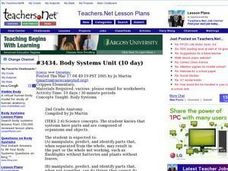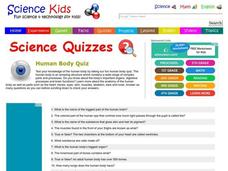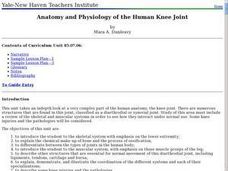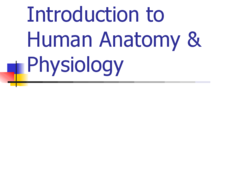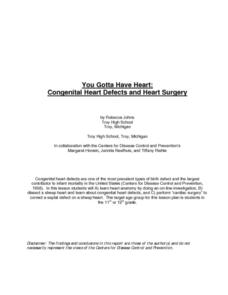Curated OER
You've Got to Have Heart
After reading an excellent description of the human heart, fifth graders look at a drawing of a human body, and choose the circle they think represents where the human heart is found. There are four circles inside the character's chest....
Pearson
The Skeletal and Muscular Systems
Introduce future doctors to medical terminology and phrases associated with the skeletal and muscular systems. As they work through a series of worksheets and exercises, high schoolers apply their knowledge of the bones of the human body...
Curated OER
The Heart of the Matter
Upper elementary pupils learn about the blood transportation system and anatomy of the human heart. They fill in an outline of the human heart (not included) focusing on the flow of blood to and from the heart. Using stethoscopes, they...
Curated OER
Life Science: Human Body Skit
Students create skits based on the human body systems. Working in groups, they role-play as organs in the various systems. They make costumes or wear signs identifying themselves as the organs in their skits.
Curated OER
Human Anatomy
Students use the web to explain how the bones serve as protection for organs in the body and recognize some of the bone structure that protect certain organs. They comprehend the different structure and functions of support tissue...
Wiley Publishing
Anatomy and Physiology Workbook
Peruse a workbook for every system in the human body. From cellular makeup to the integumentary system to human reproduction, the 300-page workbook features informative reading passages, guided practice, and humorous comic strips to get...
Baylor College
A System of Transport
Anatomy and physiology fans imitate how blood flows from place to place in the circulatory system. After constructing and calibrating their own measurement cups, learners discover that different sizes of vessels transport various volumes...
Curated OER
Living World Quiz 2
In this living world activity, students answer short answer questions about animals, the human body, food, and more. Students complete 20 short answer questions.
Curated OER
Human Body
In this health activity, students find the words that are used to describe the human body and the answers are found at the bottom of the page.
Curated OER
Body Systems Unit
Second graders complete a unit of lessons on the body systems. They watch the video, Magic Schoolbus Inside the Human Body, trace their bodies and construct the systems on the tracing, simulate the digestive system, and participate in...
Curated OER
Human Body Quiz
In this human body learning exercise, students complete short answer questions about the organs in the body and their functions. Students complete 20 questions.
Curated OER
The Human Body: A Life-Size Model On Paper
Students create a life-size paper model of the human body. They identify the major organs and state their fuction. They complete a quiz to end the lesson.
Curated OER
The Nervous System
Students investigate the nervous system. In this anatomy activity, students identify and define vocabulary related to the nervous system. Students role play the parts of a nervous system and perform an experiment measuring and comparing...
Curated OER
Anatomy- Excretory System
Fourth graders explore, analyze and identify the structures and order the process of the excretory system through a model or a diagram. They assess the names and locations of the organs involved in the excretory process, as well as...
Curated OER
Bones: Reading and Quiz
Make no bones about it- this anatomy worksheet is all about the human skeleton! Learners read a 2-page informational excerpt on bones and then use the information they learned to answer 9 recall questions, including 4 multiple-choice and...
Curated OER
Anatomy and Physiology of the Human Knee Joint
Students examine human anatomy with a focus on the knee joint. In groups, they research the chemical makeup of human bones and explain the different types of joints found in the body. To end the instructional activity, they identify the...
Curated OER
Proportion of the Human Form
Students discover proportions of the Human Body. In this anatomy lesson, students create replicas of the Human body using nothing but paper and glue. Students share their creations with the entire class.
Curated OER
Introduction to Human Anatomy & Physiology
If the only support you are in search of is lists of vocabulary terms, this presentation may fit the bill. Slides simply list terminology. These categories are included: hierarchy of structural organization, cell functions, cell...
Ask a Biologist
Human Skeleton Anatomy Activity
Young biologists piece together the puzzle of the human body with this simple anatomy worksheet. Presented with a picture of the human skeleton, students are challenged with the task of correctly identifying the 27 bones indicated on the...
Curated OER
Your Amazing Body
Students examine the different body systems and how they are interdependent on each other. In this body systems lesson students draw the body and its parts.
Curated OER
Dissection Scramble
Students discover the anatomy of a human body by dissecting a cow's eye. In this animal dissection lesson, students identify the structure of an eyeball by cutting open a cow eye and observing the insides. Students participate in an...
Curated OER
Digestive System
The focus of this presentation is the digestive system of livestock animals. The simple digestive system of swine is compared to the complex digestive system of a cow. Details of the ruminant stomach are presented, complete with a...
Curated OER
You Gotta Have Heart: Congenital Heart Defects and Heart Surgery
Assess anatomists' understanding of the structure of the mammalian heart by giving a pretest. Have them visit some websites to further learn about heart anatomy. Then take them into the laboratory to perform a dissection so that they get...
Curated OER
Organ Systems
Students examine organisms that are composed of tissues, organs, and systems. They dissect a fetal pig and explore the assigned organs systems such as the skeletal, muscular, and circulatory organs. Students identify and explain their...











